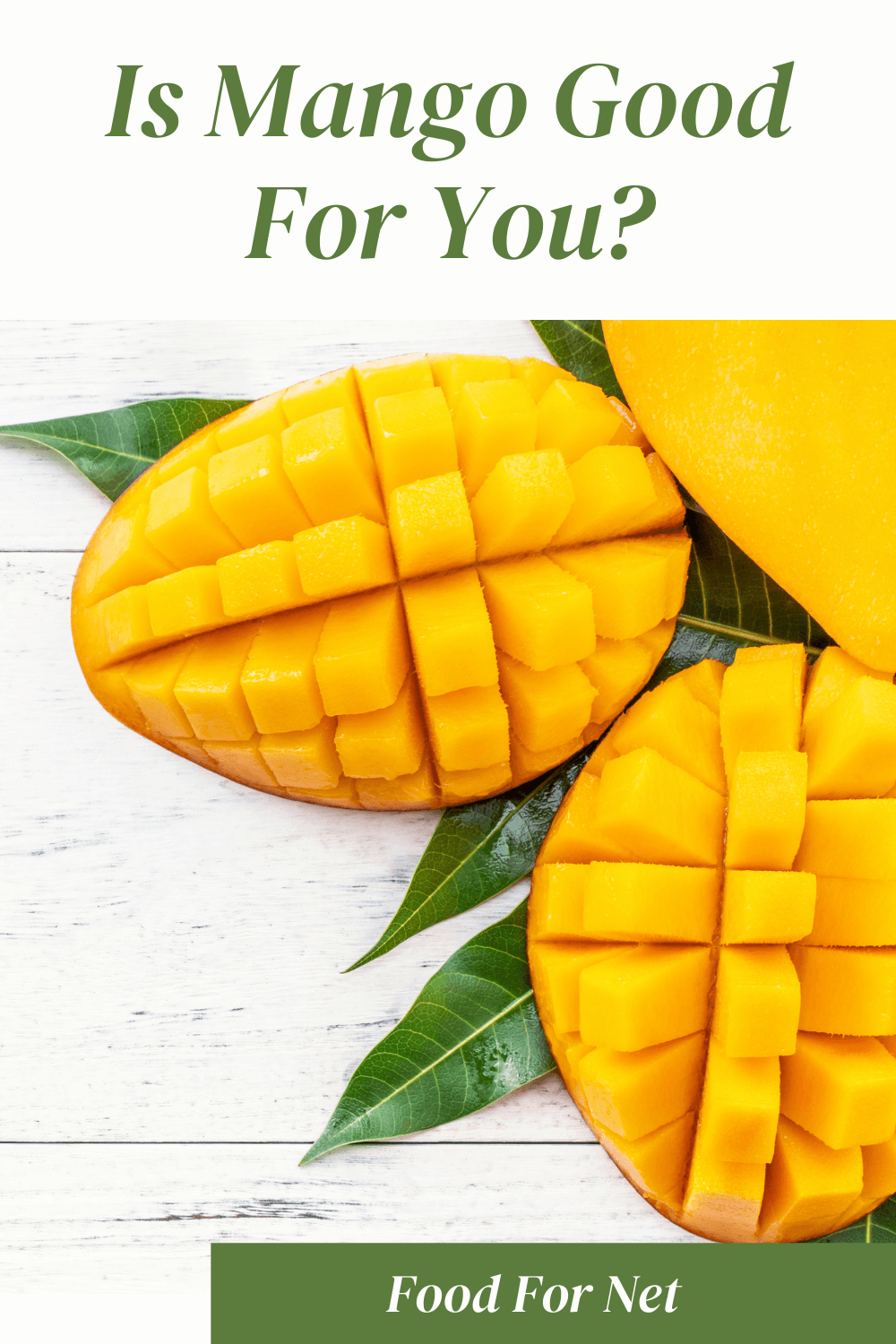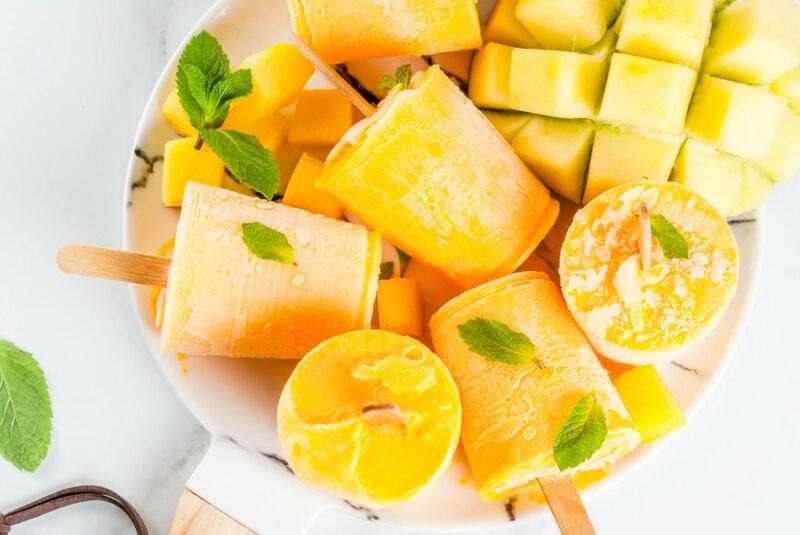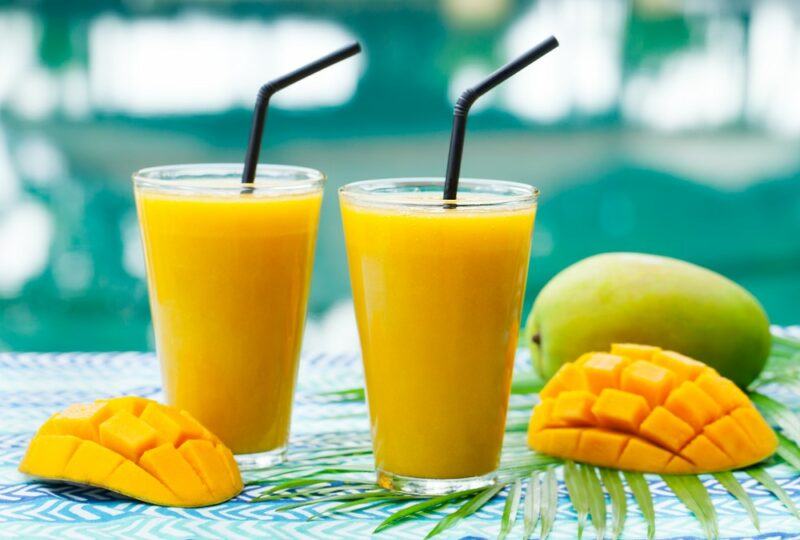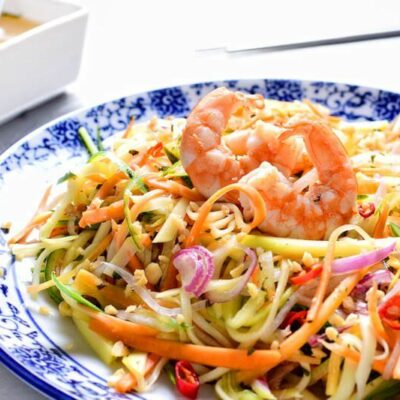
When we talk about tropical fruit, mangos are one of the first types that comes to mind. They’re large, fleshy, and sweet, with a distinctive flavor that just can’t be beaten. They are certainly delicious, but is mango good for you?
Plenty of recipes take advantage of this flavor, including chili-mango sorbet, spiced mango chutney, and Vietnamese green mango salad. Or, you can save yourself time and effort, and eat your mangos fresh instead. They’re delicious either way.
Whatever you do with them, there’s one question to ask: is mango good for you? It would be easy to say yes off the bat, as fresh fruit always comes with benefits. But, there’s more to it than that and some types of fruit are much healthier than others.
The sweetness of mangos highlights one problem – the sugar content. Don’t worry though, there are also plenty of good reasons to eat mangos regularly.
Is Mango Good For You?
- Mango Nutrition
- Benefits Of Mango
- How Mangos Could Be Harmful
- Is Dried Mango Healthy?
- Mangos Versus Guavas
- Final Thoughts
Mango Nutrition

Before we talk about how mango can help you, let’s look at the nutrients. After all, these are where most of the health benefits come from. For a cup of sliced mangos (roughly 165 grams), you get the following nutrient profile:
- Calories: 107
- Carbohydrates: 28.1 grams
- Fiber: 3.0 grams
- Sugars: 24.4 grams
- Fat: 0.4 grams
- Protein: 0.8 grams
- Vitamin C: 76% of your daily needs
- Vitamin A: 25% of your daily needs
- Vitamin B6: 11% of your daily needs
- Vitamin E: 9% of your daily needs
- Vitamin K: 9% of your daily needs
There are smaller quantities of other nutrients as well, including potassium, copper, folate, and thiamin.
As you can see, mangos aren’t a stand-out in any area except vitamin C content (and honestly, most of us get all the vitamin C that we need already). Still, small amounts of nutrients do add up, helping you to reach your daily targets.
Benefits Of Mango
Provide A Surprising Amount Of Fiber
Mangos don’t seem like a high fiber fruit, yet you still get around 3 grams of fiber in a cup of mango flesh. This is more than 10% of your daily fiber needs, which isn’t too shabby at all.
After all, fiber is crucial for our digestion. It has many other impacts too, like keeping our blood sugar levels in balance and lowering our cholesterol. Eating plenty of fiber rich foods could even decrease our risk of heart disease and diabetes.
The fiber is particularly important for mangos, helping to offset some of that sugar. It means that mangos won’t spike your blood sugar levels as much as you might expect.
Less Acidic Than Many Other Fruits
Mangos may be very relevant for anyone with acid reflux, as they’re a low acid fruit. This makes them less likely to trigger any acid reflux symptoms. You might even be able to eat them without any side effects at all.
Mangos might even be helpful, as they can improve your digestion – an effect that can decrease the risk of acid reflux side effects over time.
Even so, you’ll still need to pay attention to your own reactions, as we’re all unique. If you do get side effects from mangos, you might need to avoid them altogether and look for foods that don’t set off your acid reflux.
A Decent Source Of Plant-Based Compounds

Many of the benefits of fruits and vegetables come from their plant-based compounds, including antioxidants. In the case of mangos, key types of compounds include anthocyanins, kaempferol, catechins, mangiferin, and gallic acid. Each individual compound has a host of impacts on your health.
The compound mangiferin deserves a special mention, as it is a particularly powerful antioxidant. This makes it valuable for your health because antioxidants help to decrease oxidation throughout your body. By doing so, they can protect your cells and DNA from serious oxidative damage and perhaps even decrease your risk of disease.
As such, getting enough antioxidants in your diet is a powerful way to protect your health and help you to live longer.
Mangos aren’t the only source of antioxidants, of course. There are plenty of other antioxidant rich foods out there, including most types of fruits and vegetables. Getting a wide variety of these in your diet should provide the most benefits, as foods vary in the specific antioxidants that they offer.
Promotes Heart Health
Did you know that mangos can help with your heart?
While this outcome hasn’t been extensively studied, many of the nutrients in mangos are known to help. For example, potassium helps to decrease blood pressure levels, while magnesium is associated with good blood flow.
The antioxidants are relevant too, particularly mangiferin, which can help to protect the cells of your heart. Mangiferin may be relevant in other ways too, like decreasing levels of blood cholesterol and triglycerides.
Could Improve Your Immune Response
Mangos are thought to improve your immune response too, helping your body to fight off infections. The vitamin A and vitamin C in mangos are particularly important here, as they’re both strongly associated with your immune system.
That’s not all. Some of the other vitamins and minerals present naturally support your immune system too, including the various B vitamins, copper, and folate.
The antioxidants and other plant-based compounds in mango could be relevant too, offering further benefits.
May Protect Your Eyes
Here’s an interesting effect – mangos are thought to help keep your eyes healthy. This effect comes from lutein and zeaxanthin. These two antioxidants have a similar structure and often occur in the same foods.
Lutein and zeaxanthin are used in the retina of your eye. Among other things, they’re thought to help protect your eyes from excess light. There’s even the chance that lutein and zeaxanthin could decrease your risk of age-related eye problems.
There’s also plenty of vitamin A, which has been linked to eye health as well. In fact, insufficient vitamin A can even lead to dry eyes or more serious eye-related problems.
How Mangos Could Be Harmful

The Amount Of Sugar
You probably spotted this in the nutrient profile – mango isn’t a great choice for sugar. A cup of the fruit’s flesh contains close to 25 grams of sugar and only 3 grams of fiber.
Now, it’s much healthier to get sugar from whole fruit like mangos than from candy bars or processed food. There’s no doubt about that. Even so, the sugar in fruit can still have negative effects, like increasing inflammation or contributing to weight gain.
Mangos are also on the high end when it comes to sugar in fruit. There are plenty of better options, including berries, watermelon, and cantaloupe.
The sugar content of mangos means that you need to be very careful with the amount that you eat.
A Poor Choice For Keto
The high sugar content of mangos makes them difficult for low carb dieters. After all, you get more than 20 net grams of carbs in a cup of sliced mango.
Indeed, some versions of keto mean that you’re trying to eat less than 20 net grams of carbs per day, making mangos all but impossible. You might be able to include mangos on a less strict low carb diet, like if you’re trying to consume less than 50 or 100 net grams of carbs.
Even then, mangos mightn’t be the best idea. Plenty of other fruits are lower in carbs and contain just as many important nutrients. Some, like raspberries and blackberries, may be even more powerful than mangos.
They’re A High FODMAP Fruit
Like many types of fruit, mangos are naturally high in FODMAPs, which are a collection of fermentable carbs. These FODMAPs aren’t a problem for most people, but they can cause significant side effects for people with irritable bowel syndrome (IBS).
If you have IBS or your digestive system is sensitive for another reason, you might need to cut down on high FODMAP foods. Doing so dramatically improves symptoms for many IBS sufferers.
If nothing else, it’s an approach worth trying.
Because mangos fall into the high FODMAP category, anyone with IBS might need to avoid them entirely. Try focusing on low FODMAP fruits instead, like pineapples, oranges, and strawberries.
Fiber Side Effects

Fiber is an important macronutrient, one that offers no shortage of benefits. Yet, sometimes it can be more frustrating than helpful.
Part of the problem is the side effects. In particular, sudden changes to your fiber intake can lead to problems like stomach cramps and bloating.
This isn’t so surprising really. Fiber is important for digestion, so it makes sense that changes to fiber intake would have noticeable digestive impacts.
Most of the time, these issues are easily avoided by not making dramatic changes to fiber intake. If you do need to consume more fiber (as many of us do), start slowly and drink plenty of water.
Be cautious about having large amounts of mango in a serving too. While the fruit is delicious, large servings would be too high in sugar and could easily give you fiber-related side effects.
Is Dried Mango Healthy?
Dried mango is an interesting way to get all the nutrients from mango in a different form. Not surprisingly then, most of the same benefits apply to dried mango and to fresh mango.
The main difference is that dried mango is much more concentrated. As a result, you get more nutrients, sugar, and calories per 100 grams.
Because of this, you’ll need to be cautious with your portion sizes. It’s easy to overdo it with dried fruit, which could easily lead to high sugar intake or weight gain.
Mangos Versus Guavas
Guavas are another delicious tropical fruit and they’re similar to mangos in many ways. Despite this, guavas are actually much more powerful nutritionally.
For one thing, they’re high in fiber, making them better for your digestive system. They’re also a richer source of vitamin C, potassium, and magnesium. They may even be better for antioxidants, as they contain considerably more lycopene than you find in mangos.
Final Thoughts

Fresh fruit is a critical part of any healthy diet, providing you with plenty of fiber, nutrients, and antioxidants. Mangos are just one of many delicious types of fruit that you can try. However, it’s important to be cautious with mangos, as they contain more sugar than many other fruits and are high in FODMAPs too. These features mean that mangos are best enjoyed in moderation.
Frequently Asked Questions
Can You Eat Mango Skin?
Mango skin is completely edible, meaning you can eat a mango just like an apple. There are even plenty of powerful plant-based compounds in the skin, not to mention the fiber content.
That said, mango skins aren’t particularly enjoyable. Many people find them to be awful and simply eat the flesh of the fruit instead. There’s also the risk of contamination or pesticides on the skin, which aren’t good for your health. So, it’s best to only eat mango skin if it comes from a reliable source.
Is Mango A Citrus Fruit?
While mangos have some of the sharp flavors that you find in citrus fruit, it isn’t a type of citrus at all. It is considered a stone fruit instead, based on the large stone found in the middle.
How Do You Eat A Mango?
There are multiple ways to eat fresh mango and no single correct approach. However, most of these start by cutting into the mango. There are a few approaches for doing so. One is to make straight cuts through the mango, one on either side of the seed. Doing so gives you two seedless mango halves that are easy to work with.
Is Mango Acidic?
Mangos have a slight acidity, with the pH of ripe mangos ranging from 5.5 to 6. This makes them less acidic than many other fruits and a useful choice if you experience acid reflux.
Is Mango Good For Weight Loss?
Fruit is always good for weight loss, due to the fiber, nutrients, and antioxidants. Mango has this effect too, but you need to be careful, as it’s also very high in sugar. It’s often best to stick with lower sugar fruits, like berries and peaches.






 20 Best Foods For Insulin Resistance, And Three Tips For Increasing Insulin Sensitivity
20 Best Foods For Insulin Resistance, And Three Tips For Increasing Insulin Sensitivity
Leave a Reply